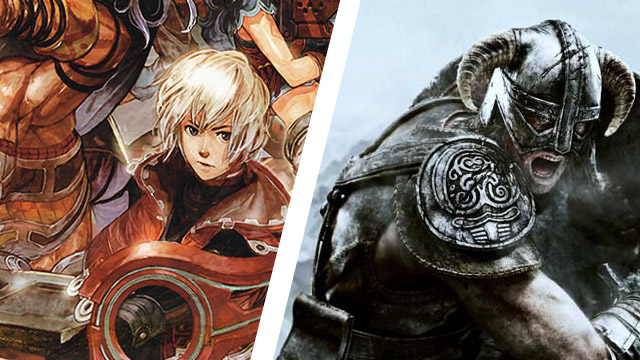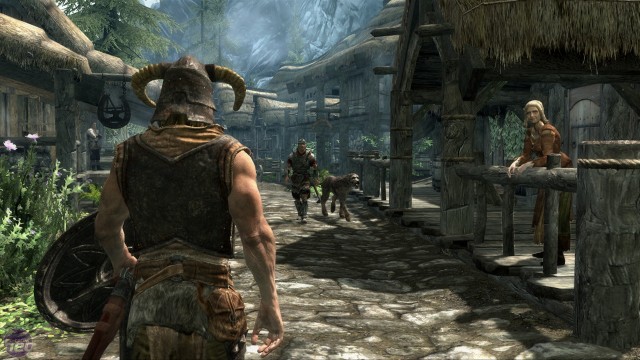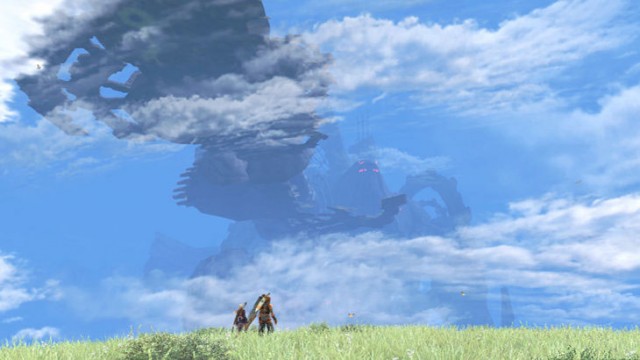
This article was originally published on April 8, 2013.
In the fall of 2011, I ventured into the world of Xenoblade Chronicles, importing the game from the United Kingdom when it seemed Nintendo of America had no interest in bringing the game stateside. (NOA subsequently did the improbable.) After spending nearly 125 hours in the vast lands of Bionis and beyond, it’s safe to say that I liked it, and I wasn’t the only one, whether it be here at the Dojo or in the mainstream gaming media. Unfortunately, if you haven’t played it yet, getting your hands on a disc will not be cheap; at the time of writing, used copies of the American release were running between $80 and $90 on eBay.
A little over a year later, in the fall of 2012, I ventured into another sprawling world, that of Bethesda’s latest monster effort, Elder Scrolls V: Skyrim. I played it on the only avenue available to me, a PlayStation 3. This is important because the PS3 version is the most technically troubled, and indeed I’ve finally encountered the infamous lag problem that has plagued the game. I’m 65 hours in and officially on hiatus because the random hold-ups of the game are finally becoming persistent enough so to as to rob the game of its early fun, and hours of trying various internet fixes, from deep hard drive formats to voodoo, have all failed to fix things. This predicament is mitigated by the fact that I got the game off of eBay for only $20, shipping and all, but it also means that much of the game’s boundless quests and grottoes are still ahead of me. I do not know if I will return in my current character or if I will start anew.
Nevertheless, as I explored the land of Skyrim for those dozens of hours, I found myself reflecting on its connections to the world of Bionis, both in terms of how they stack up and how they move the role playing genre. What lies ahead are some of my thoughts, and how they relate to the state of the genre.
Head to Head
Both Xenoblade and Skryim come from storied pedigrees, although the latter is far more well known to the larger gaming masses than the former. Skyrim, for its part, comes from the well-known and well-funded brain trust at Bethesda, a company who has struck gold most famously with its Elder Scrolls line and its foray in to the wastelands of Fallout 3 and Fallout: New Vegas. Xenoblade’s development house, Monolith Soft, is known only to its cult following, having produced the Xenosaga trilogy and GameCube’s two Baten Kaitos titles. (Monolith is also a Nintendo-exclusive developer; the Big N acquired a controlling interest in the company from Namco Bandai in 2007.)

Skyrim, then, sports the look of the bigger budget. Its graphics are better, especially up-close– not a surprise given its technically superior platforms– but it is also a longer, deeper game with a more robust soundtrack and a bigger game world to explore. This is no slight to Xenoblade, which is bigger than any single-player Japanese role playing game I know of, but is rather an affirmation of Skyrim‘s nearly unfathomable length; friends and online folks alike regularly cite playtimes close to 200 hours, and that doesn’t include additional time gained from the game’s downloadable content. Skyrim boasts a legion of castles, forts, dungeons and grottoes that Xenoblade simply cannot match.
That’s not to say Xenoblade doesn’t have its advantages. I think its narrative is better and its character development is far superior; as a player, I cared far more for Shulk and company than any characters in Skyrim. I think the art design of Bionis and Mechonis, even with the lower polygon count, is more varied, interesting and awe-inspiring than the sometimes-drab and repetitive world of Skyrim. I often had true “stop-and-stare” moments in Xenoblade; I had fewer such moments in Skyrim. I would also pointedly note that in 120+ hours of Xenoblade my encounters with any glitches or bugs were so few as to be beyond my recall, and the only time the game slowed down was during a few crowded battles with massive monsters. It’s hard to see how Monolith could have coded a more stable, more dependable game, loading and saving quickly and showing no signs of the lag, freezes, or crashes endemic to Skyrim.
Oceans Apart
Role playing has changed a great deal in recent years, but American role playing (often called “Western” RPGs, or WRPGs) and Japanese role playing (JRPGs) still operate on principles that reflect their own unique culture values. Because of that, it makes sense to evaluate Skyrim and Xenoblade in the context of their points of origin.
American culture, for example, has long emphasized self-reliance and personal freedom. American history makes big beans out of things like “rugged individualism” and the Wild West, and modern American politics is as frosty toward universal health care and high taxes as Americans in the Great Depression were toward government handouts, even to the brink of starvation.
American-made games reflect these American cultural ideas, and Skyrim is an exemplar of WRPGs. Here is a game that is individualistic right from the start, with a player-created character, unbounded freedom to explore, and absolutely no restrictions on when and how you can do things. Customization runs deep and the game’s adaptive difficulty leaves few locations off-limits. The game also keeps it American by emphasizing the action over the tactical; sure, you can issue some commands, but mostly the game is just about assaulting the enemy with the full force of a well-timed warhammer blow or a giant fireball. Skyrim‘s best impersonation of a team consists of the player, a companion, a dog, and (in the overworld) a horse, but the game is really about the player and his or her destiny, not those other extras.

Japanese culture is a different matter. The East has for millennia emphasized the virtues of honor, family, simplicity, and work ethic. Japanese history is a tale of ethnic solidarity, often against their old Chinese rivals, and achieving beyond their own perceived capacities. The honor of the samurai and the reverence for the deified emperor have dominated Japanese popular thought throughout the last millennium, and modern Japanese politics, business, and culture continues to emphasize loyalty and honor (and, one might note, discretion in the private affairs). America was well aware of this, for example, when they decided not to drop the atomic bomb on Tokyo during World War II, in part because they feared they might accidentally kill the emperor and destroy any hope of Japanese surrender.
Xenoblade is as Japanese as Skyrim is American. Honor, loyalty and friendship run deep. Far from a solo affair, Xenoblade‘s lifeblood is the team, both on the battlefield and in personal relationships. The Japanese love their bands of seven, whether it be Seven Samurai or the iconic seven of Chrono Trigger. Sure enough, the party of Xenoblade Chronicles grows to seven strong, each with unique abilities and powers that make them difficult to use in isolation but formidable as a team. The game certainly moves but it is more tactical than action, with players encouraged to take risks and think. Characters are introspective about themselves and their world, and their bond together is central to the narrative. Xenoblade is, fascinatingly, both a single-player game and the antithesis of a solitary experience.
Pages: 1 2




 ShareThis
ShareThis






Xenoblade just showed up on the Wii U eShop, and claims that it supports the Wii U gamepad as a controller (not just a display). Can anyone here verify whether that’s true? Not that I need to buy this game a third time, but still. :^)
I’m pretty sure (although not positive) that the answer is yes for any Wii game re-released on the eShop.